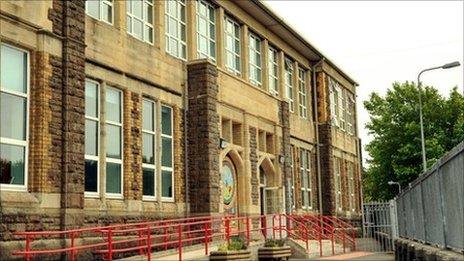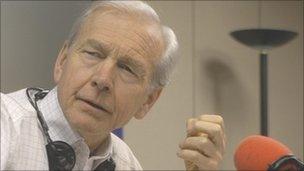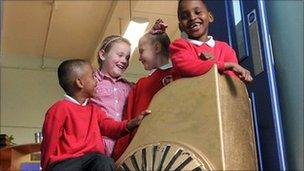Lessons for John Humphrys in his Cardiff primary school
- Published

There was no Foundation Phase in John Humphrys' days at Moorland Primary School in Splott
When John Humphrys went back to his old Cardiff primary school for a BBC Radio 4 documentary he learned another lesson, all these years on.
The Today programme presenter was a pupil at Moorland Primary in the 1940s.
He passed his Eleven-Plus at the school in Splott (a name, incidentally, which rarely fails to elicit a smile from those new to the Welsh capital).
The young Humphrys' Moorland experience was his first formal educational step, and it helped lead him to an outstanding journalistic career.
Some six decades later his programme, Testing Times, set out to investigate the reasons behind Wales' slump in the international standings for child literacy and numeracy.
According to Moorland's head mistress, Jane Jenkins, he left with a fresh perspective on Wales' Foundation Phase project.
The Foundation Phase, the Welsh Government's flagship primary education policy, says children under seven should learn through play, experience and their own curiosity, rather than by a traditional eyes-to-the-front teacher-led approach.
"John Humphrys was lovely in the end, but I think he arrived with the idea that Foundation Phase was some sort of fangled, right-on, PC creation," she said.
"In fact Foundation Phase is nothing but common sense, and follows the best practice of the most successful European nations, such as Finland and Italy."

John Humphrys in familiar inquisitive mode in the Today programme studio
"Once he saw the children actually wanting to learn new things, because they'd seen other children experimenting, I think John was convinced that we were succeeding in engaging children and tapping their potential."
"He certainly seemed to think it was a big improvement on his own time at Moorland."
As he relates in the documentary, the first thing he noticed on walking through the school gates was the physical transformation.
"The smell has changed," he says.
"Gone is the whiff of the furniture polish they used to use on the desks, mingled with chalk dust and the smell of sweaty children who didn't bath very much. Because many of us didn't have bathrooms!"
"Gone also are the classrooms; or at least classrooms as I used to know them, with rows of desks all pointing forwards towards the teacher. Now children seem to learn by experiencing and doing; through playing, you might say."
"It's all a big shock for me, but they certainly seem to be interested and enjoying themselves, and there's no need any more for them to be kept in line with Mr Brown's cane."
Early strides
But while Welsh education has been criticised by some academics for scrapping Sats (Standard Assessment Tests) and school league tables without replacing them with verifiable alternatives, there is support for the early strides being made under Foundation Phase.
Humphrys speaks in the programme to head teachers who are against the re-introduction of league tables and Sats. He also hears how the Foundation Phase helps children to learn to read in new ways.
One expert, Andreas Schleicher, head of Pisa (Programme for International Student Assessment) says: "Clearly you need some benchmark for success and whether abandoning those kind of assessments altogether was the right thing, that's really up for debate.
"At the end of the day teachers, students, parents need to know how well they are progressing."
Humphrys was also told by the Education Minister, Leighton Andrews, that Wales "got rid of Sats for the right reasons" and that league tables are not "the be all and end all".
But Mr Andrews told the Today presenter that he was making an adjustment after the scrapping of Sats. This, said the minister, meant national reading and numeracy tests for pupils.
John Humphrys is not the only distinguished figure to have walked through Moorland's gates. His late brother, the BBC Wales sport correspondent Bob Humphrys, went there, as did singer Dame Shirley Bassey. It was also the first school at which the former MEP Glenys - now Baroness - Kinnock taught.

The same chariot the young John Humphrys rode on in a school production in the 1950s
"It's a heritage we're aware of, and definitely proud of, but, in their own way, every child can achieve as much as John, Glenys and Dame Shirley," said Ms Jenkins.
"We have a six-year-old boy in our school who's the first person in his family ever to be able to read and write.
"That's not because we forced him to learn - he'd have run a mile - it's because he was curious enough of what everyone else was doing, to want to find out for himself."
"To my way of thinking, that's every bit as much of an achievement as anything any of our former pupils have ever done."
The visit also unearthed a remarkable relic of Humphrys' school days: the same replica chariot which the young John had ridden in a school play.
"That chariot is the sharpest memory of my primary school days; I certainly can't remember how I learned to read or write," Humphrys says.
"But aren't all our judgements, or prejudices, about education informed by our own childhood experiences?"
"I don't envy the politician who decides to rip up the system and start again. If it comes off he's a hero, but what if it doesn't?"
"The politician will have another chance at the next election, but what about the child? Because, after all, we only get one childhood".
Testing Times, presented by John Humphrys, is on BBC Radio 4 on Sunday, 26 June at 1330 BST.
- Published28 May 2011
- Published1 September 2010